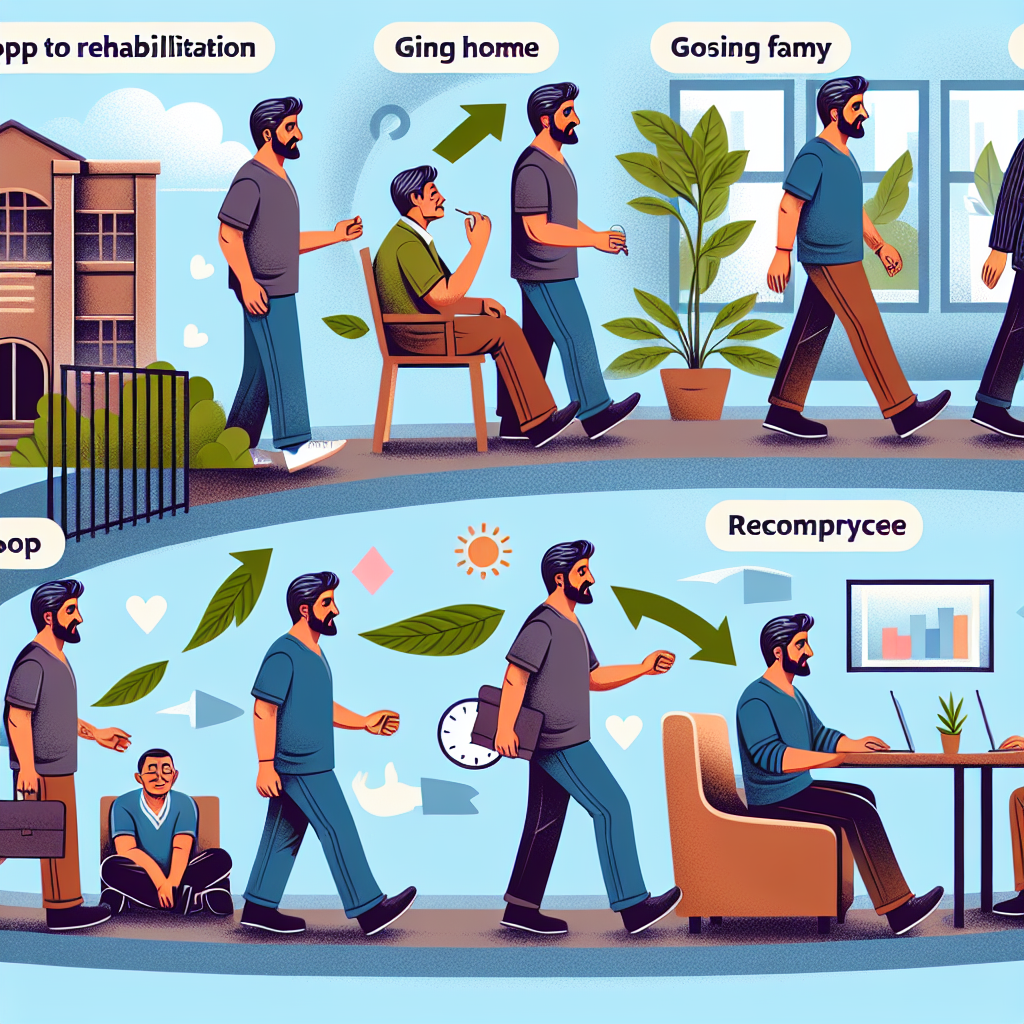-
Table of Contents
- Introduction
- Finding Purpose: Steps to Rediscover Your Passion After LSD Addiction
- Building a Support Network: How to Connect with Others on the Same Journey
- Healthy Habits: Establishing a Routine for a Balanced Life Post-Addiction
- Mindfulness and Meditation: Techniques to Stay Grounded and Focused
- Q&A
- Conclusion
“Reclaim Your Future: Rebuild, Renew, and Thrive Beyond LSD Addiction”
Introduction

Rebuilding your life after overcoming LSD addiction is a profound journey of self-discovery, healing, and transformation. This process involves not only breaking free from the grip of addiction but also addressing the underlying issues that may have contributed to substance abuse. It requires a commitment to personal growth, the development of healthy coping mechanisms, and the establishment of a supportive network. By embracing new habits, seeking professional guidance, and fostering a positive mindset, individuals can reclaim their lives, restore their sense of purpose, and build a future filled with hope and resilience.
Finding Purpose: Steps to Rediscover Your Passion After LSD Addiction
Rebuilding your life after overcoming LSD addiction is a journey that requires patience, resilience, and a deep commitment to personal growth. One of the most crucial steps in this process is finding purpose and rediscovering your passion. This can be a transformative experience, allowing you to reconnect with your true self and create a fulfilling life. To begin this journey, it is essential to understand that the path to rediscovery is not linear; it involves a series of steps that build upon one another, each contributing to your overall sense of purpose and well-being.
Initially, it is important to take time for self-reflection. This involves looking inward and assessing your values, interests, and strengths. Reflecting on your past experiences, both positive and negative, can provide valuable insights into what truly matters to you. Journaling can be a helpful tool during this phase, as it allows you to articulate your thoughts and feelings, making them more tangible and easier to understand. Additionally, seeking the guidance of a therapist or counselor can provide a safe space to explore these reflections and gain professional insights.
As you gain clarity on your values and interests, the next step is to set realistic and achievable goals. These goals should align with your newfound understanding of what brings you joy and fulfillment. Start small, focusing on short-term objectives that can be accomplished within a few weeks or months. Achieving these smaller goals can build momentum and boost your confidence, making it easier to tackle larger, long-term aspirations. Remember, the key is to be patient with yourself and celebrate each milestone, no matter how minor it may seem.
Engaging in new activities and hobbies is another effective way to rediscover your passion. Experimenting with different pursuits can help you identify what resonates with you and what does not. Whether it’s painting, hiking, volunteering, or learning a new skill, immersing yourself in diverse experiences can reignite your curiosity and enthusiasm for life. Moreover, these activities can serve as healthy distractions, keeping your mind occupied and reducing the risk of relapse.
Building a supportive network is also crucial in this journey. Surrounding yourself with positive influences, such as friends, family, or support groups, can provide encouragement and accountability. These connections can offer a sense of belonging and remind you that you are not alone in your struggles. Sharing your goals and progress with others can also foster a sense of community and mutual support, further reinforcing your commitment to personal growth.
In addition to external support, cultivating self-compassion is vital. Overcoming addiction is a significant achievement, and it is important to acknowledge your progress and be kind to yourself. Practicing mindfulness and meditation can help you stay present and manage any negative thoughts or emotions that may arise. These practices can also enhance your self-awareness, making it easier to stay aligned with your values and goals.
Finally, giving back to others can be a powerful way to find purpose and meaning. Volunteering or mentoring individuals who are facing similar challenges can provide a sense of fulfillment and reinforce your commitment to a life of sobriety. Helping others can also remind you of your own strength and resilience, further motivating you to stay on your path of recovery.
In conclusion, finding purpose and rediscovering your passion after overcoming LSD addiction is a multifaceted process that involves self-reflection, goal-setting, exploration, building a support network, practicing self-compassion, and giving back. By taking these steps, you can create a life that is not only free from addiction but also rich with meaning and joy. Remember, the journey may be challenging, but with perseverance and a positive mindset, you can rebuild your life and thrive.
Building a Support Network: How to Connect with Others on the Same Journey
Rebuilding your life after overcoming LSD addiction is a journey that requires strength, resilience, and a solid support network. Connecting with others who are on the same path can be incredibly beneficial, providing both emotional support and practical advice. Establishing a support network is not just about finding people who understand your struggles; it’s about creating a community that fosters growth, healing, and mutual encouragement.
One of the first steps in building a support network is to seek out local support groups. These groups often consist of individuals who have faced similar challenges and can offer firsthand insights into the recovery process. Attending regular meetings can help you feel less isolated and more understood. Moreover, these gatherings provide a safe space to share your experiences, fears, and triumphs without judgment. Over time, the bonds formed in these groups can become a crucial part of your recovery journey.
In addition to local support groups, online communities can also play a significant role in your recovery. The internet offers a plethora of forums, social media groups, and websites dedicated to addiction recovery. These platforms allow you to connect with people from all over the world, broadening your support network and exposing you to diverse perspectives and coping strategies. Engaging in online discussions can be particularly helpful if you live in a remote area or have difficulty attending in-person meetings. The anonymity of online interactions can also make it easier to open up about your struggles and seek advice.
While connecting with others who have faced similar challenges is essential, it’s equally important to involve your family and friends in your recovery process. Open communication with your loved ones can help them understand what you’re going through and how they can support you. Educating them about LSD addiction and recovery can foster empathy and reduce any stigma they might hold. Additionally, involving your family and friends in your journey can strengthen your relationships and provide a broader support system.
Another valuable resource in building your support network is professional help. Therapists, counselors, and addiction specialists can offer expert guidance and personalized strategies for maintaining sobriety. These professionals can also help you navigate the emotional and psychological aspects of recovery, which are often as challenging as the physical ones. Regular therapy sessions can provide a structured environment to address underlying issues that may have contributed to your addiction, helping you build a more stable foundation for your new life.
Volunteering and engaging in community activities can also enhance your support network. By giving back to your community, you can find a sense of purpose and fulfillment that can be incredibly motivating. Volunteering can also introduce you to new people who share your values and interests, further expanding your support system. Engaging in community activities can help you rebuild your social life in a positive and meaningful way, reducing the risk of relapse.
Lastly, it’s important to remember that building a support network is an ongoing process. Relationships take time to develop, and it’s normal to encounter setbacks along the way. However, by consistently reaching out and staying engaged, you can create a robust network of support that will be instrumental in your recovery journey. Surrounding yourself with people who understand, support, and encourage you can make all the difference as you rebuild your life after overcoming LSD addiction.
Healthy Habits: Establishing a Routine for a Balanced Life Post-Addiction
Rebuilding your life after overcoming LSD addiction is a journey that requires dedication, resilience, and a commitment to establishing healthy habits. One of the most effective ways to ensure long-term recovery and maintain a balanced life is by creating a structured routine. This routine serves as a foundation for stability, helping you navigate the complexities of post-addiction life with confidence and purpose.
To begin with, it is essential to recognize the importance of a consistent daily schedule. A well-structured routine can provide a sense of normalcy and predictability, which is particularly beneficial after the chaos that often accompanies addiction. Start by setting a regular wake-up time and bedtime, ensuring you get adequate sleep each night. Quality sleep is crucial for mental and physical health, aiding in emotional regulation and cognitive function.
Incorporating physical activity into your daily routine is another vital component. Exercise not only improves physical health but also releases endorphins, which can enhance mood and reduce stress. Whether it’s a morning jog, a yoga session, or a visit to the gym, find an activity that you enjoy and make it a regular part of your day. This commitment to physical well-being can serve as a powerful reminder of your progress and dedication to a healthier lifestyle.
Nutrition also plays a significant role in maintaining balance post-addiction. A well-balanced diet can help restore the body’s natural equilibrium, providing the necessary nutrients to support overall health. Plan your meals to include a variety of fruits, vegetables, lean proteins, and whole grains. Avoiding processed foods and excessive sugar can prevent energy crashes and mood swings, contributing to a more stable and positive outlook.
Equally important is the practice of mindfulness and self-care. Incorporating activities such as meditation, journaling, or deep-breathing exercises can help manage stress and promote emotional well-being. These practices encourage self-reflection and provide an opportunity to process emotions in a healthy manner. Setting aside time each day for these activities can create a sense of inner peace and resilience.
Building a support network is another crucial aspect of establishing a balanced life post-addiction. Surround yourself with positive influences, whether it’s family, friends, or support groups. Engaging with others who understand your journey can provide encouragement and accountability. Regularly attending meetings or therapy sessions can also offer valuable insights and coping strategies, reinforcing your commitment to recovery.
Moreover, setting achievable goals can give you a sense of direction and purpose. These goals can be related to personal growth, career aspirations, or hobbies. Breaking them down into smaller, manageable steps can make them less overwhelming and more attainable. Celebrating your progress, no matter how small, can boost your confidence and motivation.
Lastly, it is essential to remain patient and compassionate with yourself. Recovery is not a linear process, and setbacks may occur. However, viewing these challenges as opportunities for growth rather than failures can foster resilience. Embrace the journey with an open heart and a willingness to learn from each experience.
In conclusion, rebuilding your life after overcoming LSD addiction involves establishing a routine that promotes physical, emotional, and mental well-being. By incorporating consistent sleep patterns, regular exercise, balanced nutrition, mindfulness practices, a supportive network, and achievable goals, you can create a foundation for a balanced and fulfilling life. Remember, each step you take towards establishing these healthy habits is a testament to your strength and commitment to a brighter future.
Mindfulness and Meditation: Techniques to Stay Grounded and Focused
Rebuilding your life after overcoming LSD addiction is a journey that requires resilience, determination, and a commitment to personal growth. One of the most effective ways to stay grounded and focused during this transformative period is through the practice of mindfulness and meditation. These techniques not only help in maintaining sobriety but also foster a deeper connection with oneself, promoting overall well-being.
Mindfulness, at its core, is the practice of being fully present in the moment. It involves paying attention to your thoughts, feelings, and sensations without judgment. This heightened awareness can be particularly beneficial for those recovering from addiction, as it helps in recognizing and managing triggers that may lead to relapse. By cultivating a mindful approach to daily life, individuals can develop a greater sense of control over their actions and reactions.
Meditation, on the other hand, is a practice that involves focusing the mind and eliminating distractions. It can take many forms, from guided meditations to silent sitting practices. For those in recovery, meditation serves as a powerful tool to calm the mind, reduce stress, and enhance emotional stability. Regular meditation practice can lead to a more balanced and centered state of being, making it easier to navigate the challenges of post-addiction life.
Incorporating mindfulness and meditation into your daily routine can be a game-changer. Start by setting aside a few minutes each day for these practices. You might begin with simple breathing exercises, focusing on the inhale and exhale, and gradually progress to more extended meditation sessions. Consistency is key; the more you practice, the more natural it will become.
As you delve deeper into mindfulness, you may find it helpful to engage in mindful activities such as walking, eating, or even washing dishes. These activities, when done mindfully, can transform mundane tasks into opportunities for reflection and self-awareness. For instance, while eating, pay attention to the flavors, textures, and sensations of each bite. This not only enhances the eating experience but also fosters a sense of gratitude and appreciation for the present moment.
Another effective technique is the body scan meditation, which involves mentally scanning your body from head to toe, acknowledging any areas of tension or discomfort. This practice can help in releasing physical stress and promoting relaxation. Additionally, loving-kindness meditation, which focuses on sending positive intentions to yourself and others, can cultivate compassion and empathy, essential qualities for rebuilding relationships and fostering a supportive community.
It’s important to remember that mindfulness and meditation are not about achieving perfection but about progress and self-compassion. There will be days when your mind feels scattered or when emotions run high. During these times, gently remind yourself that it’s okay to have setbacks and that each moment is an opportunity to start anew.
Moreover, seeking support from mindfulness and meditation groups can provide a sense of community and shared experience. Connecting with others who are on a similar path can offer encouragement, accountability, and valuable insights. Many communities offer free or low-cost meditation classes, and numerous online resources are available for those who prefer to practice at home.
In conclusion, mindfulness and meditation are powerful allies in the journey of rebuilding your life after overcoming LSD addiction. By staying grounded and focused through these practices, you can cultivate a deeper sense of self-awareness, emotional stability, and inner peace. Embrace each moment with an open heart and mind, and remember that every step forward, no matter how small, is a testament to your strength and resilience.
Q&A
1. **What are the first steps to take after overcoming LSD addiction?**
– Seek professional counseling or therapy, establish a support network, and create a structured daily routine.
2. **How can one maintain sobriety after overcoming LSD addiction?**
– Engage in regular therapy sessions, join support groups like Narcotics Anonymous, and avoid triggers or environments associated with past drug use.
3. **What lifestyle changes can support long-term recovery from LSD addiction?**
– Adopt a healthy diet, exercise regularly, practice mindfulness or meditation, and pursue hobbies or interests that provide a sense of purpose.
4. **How important is a support system in rebuilding life after LSD addiction?**
– A strong support system is crucial as it provides emotional support, accountability, and encouragement, which are essential for maintaining sobriety and rebuilding a fulfilling life.
Conclusion
Rebuilding your life after overcoming LSD addiction involves a multifaceted approach that includes seeking professional help, establishing a strong support network, adopting healthy lifestyle changes, and setting realistic goals. Professional help, such as therapy and counseling, can address underlying issues and provide coping strategies. A support network of family, friends, and support groups offers emotional and practical assistance. Healthy lifestyle changes, including regular exercise, a balanced diet, and mindfulness practices, contribute to overall well-being. Setting realistic, achievable goals helps maintain focus and motivation. With dedication and the right resources, it is possible to rebuild a fulfilling and meaningful life post-addiction.



